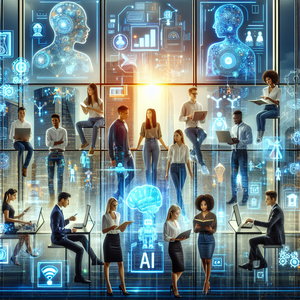The Rise of AI and the Social Scientist's Role

At first glance, social science and artificial intelligence may seem like unrelated fields. Social science focuses on understanding human behavior, cultural dynamics, and societal systems, while AI is concerned with building machines that mimic or augment human intelligence. However, upon closer inspection, the two domains are deeply intertwined. AI systems are designed to solve problems, make decisions, and often interact with humans. These systems rely heavily on data—data that is generated by humans and is inherently shaped by the complexities of human society. Without a nuanced understanding of human behavior and societal contexts, AI systems risk perpetuating biases, reinforcing stereotypes, and excluding marginalized populations. Social scientists, with their expertise in interpreting societal trends and human behavior, are uniquely positioned to address these challenges. For instance, AI is now widely used in high-stakes domains such as hiring, lending, and criminal justice. Social scientists can evaluate these algorithms to determine whether they unintentionally perpetuate biases or harm vulnerable groups. By analyzing the broader social implications of AI, they can help ensure that these technologies serve society equitably, rather than exacerbating existing inequalities.
Key Roles for Social Scientists in AI
As AI becomes more pervasive, the demand for social scientists in the field is growing. Here are some of the key roles they can play: 1. Ethics and Governance: One of the most pressing challenges in AI is ensuring its ethical use. Who determines what constitutes fairness or justice in AI decision-making? How can we prevent AI from perpetuating harmful stereotypes? Social scientists, particularly those with backgrounds in sociology, anthropology, or philosophy, can help design ethical frameworks to guide the development and deployment of AI systems. For example, ethicists have played a significant role in the development of OpenAI’s GPT models, working to minimize harmful content generation and ensure responsible use. By collaborating with engineers, policymakers, and ethicists, social scientists can help establish guidelines that align AI development with societal values. 2. Human Behavior Modeling: AI systems often aim to mimic or predict human behavior, as seen in recommendation algorithms, virtual assistants, and chatbots. Social scientists with expertise in psychology, behavioral economics, or anthropology can provide the theoretical and empirical foundations needed to model human behavior more accurately. For instance, customer service chatbots are designed to interact with users in a human-like manner. Social scientists can conduct user research to better understand how people interact with technology, identify pain points, and develop conversational styles that improve user satisfaction and engagement. 3. Algorithmic Fairness and Bias Mitigation: AI systems are only as good as the data they are trained on, and much of this data reflects existing societal inequities. Social scientists can analyze training datasets to identify and mitigate biases, ensuring that AI tools do not discriminate against certain populations. An example of this is the discovery of racial and gender biases in facial recognition software, which has been shown to perform poorly on individuals with darker skin tones. By working alongside data scientists, social scientists can help pinpoint the root causes of these biases and propose solutions, such as diversifying training datasets or revising algorithmic assumptions. 4. Cultural Sensitivity in Global AI Applications: AI tools are increasingly deployed on a global scale, yet they are often designed with a narrow cultural lens. Social scientists with expertise in cross-cultural analysis can help ensure that AI systems are culturally sensitive and effective in diverse contexts. For example, voice recognition systems frequently struggle with non-Western accents, leading to frustration and exclusion for users in non-English-speaking regions. By involving social scientists in the development process, companies can create more inclusive products that cater to a global audience.
How to Break Into AI as a Social Scientist
For social scientists who may be unfamiliar with technical fields like AI, the prospect of transitioning into this domain can feel daunting. However, the overlap between social science and AI presents a unique opportunity to leverage existing skills while acquiring new ones. Here are some actionable steps to get started: 1. Upskill in Data and Technology: While a deep technical background is not always necessary, familiarity with basic AI concepts, programming languages like Python, and data analysis tools can be invaluable. Online platforms like Coursera, edX, and Udemy offer beginner-friendly courses on machine learning, data science, and AI ethics. 2. Leverage Your Existing Strengths: Social scientists excel in areas such as qualitative research, critical thinking, and communication. These skills are highly transferable to roles in AI ethics, user research, and policy development. When applying for jobs, highlight how your expertise in understanding human behavior and societal systems can contribute to the development of responsible AI. 3. Network Strategically: Attend AI conferences, join interdisciplinary research groups, or participate in meetups focused on technology and ethics. Networking with professionals in the tech industry can help you identify opportunities and collaborations. 4. Showcase Your Value: Create a portfolio, blog, or academic publications that demonstrate your ability to apply social science principles to AI challenges. For example, you could write about the ethical implications of AI in hiring practices or propose solutions for algorithmic bias in criminal justice. 5. Collaborate with Tech Professionals: Many social scientists in AI work collaboratively with engineers, data scientists, and designers. Seek out interdisciplinary projects where you can contribute your expertise in human behavior, ethics, or cultural analysis.
Real-World Examples of Social Scientists in AI
Social scientists are already making significant contributions to the development of AI. Here are a few examples: - AI Ethics Boards: Companies like Google and Microsoft have established AI ethics boards that include social scientists to ensure responsible AI development. - Algorithmic Fairness Initiatives: At institutions like MIT and Stanford, social scientists are collaborating with data scientists to create tools that detect and reduce bias in machine learning models. - Behavioral Insights in AI Design: Social scientists have contributed to AI-powered mental health apps, ensuring they align with evidence-based psychological principles. These examples highlight the tangible impact that social scientists can have in shaping AI technologies that are ethical, equitable, and human-centered.
As AI continues to transform industries and societies, its success will depend not only on technical innovation but also on its alignment with human values. Social scientists bring a unique perspective to the table, offering critical insights into ethics, fairness, and cultural sensitivity. By stepping into roles in AI ethics, behavioral modeling, and bias mitigation, social scientists can help create technologies that benefit all members of society—not just a privileged few. For social scientists who may feel uncertain about their future, especially those who have been displaced from traditional roles, AI offers a chance to redefine their career paths while making a meaningful impact. The rise of AI is not just a technological revolution; it is a societal one, and social scientists are uniquely equipped to ensure that this revolution is inclusive, ethical, and human-centered. As we look to the future, the collaboration between technology and social science will be essential in shaping an AI-powered world that works for everyone.
AI Ethics Specialist
OpenAI, Google DeepMind, Microsoft, and non-profits like Partnership on AI
Job Responsibilities
Develop ethical frameworks to guide the creation and deployment of AI systems, ensuring alignment with societal values and human rights.
Collaborate with engineers, policymakers, and ethicists to mitigate risks related to algorithmic bias, privacy, and misuse.
Stay informed on regulations like GDPR and AI-specific policymaking to advise organizations on compliance.
Unique Skills
Background in philosophy, sociology, or law; understanding of ethical theory and its application in AI governance.
Algorithmic Bias Analyst
IBM, Meta, nonprofit research groups, and government agencies
Job Responsibilities
Evaluate AI models and datasets to identify and address biases that could disadvantage specific groups.
Collaborate with data scientists to propose strategies like diverse dataset curation and fairness-aware machine learning techniques.
Conduct impact assessments of AI systems in high-stakes domains such as hiring, lending, or criminal justice.
Unique Skills
Proficiency in statistical analysis, knowledge of social inequities, and an understanding of machine learning principles.
AI User Experience (UX) Researcher
Amazon (Alexa team), Apple (Siri), and startups developing AI-driven tools
Job Responsibilities
Conduct qualitative and quantitative research to understand how humans interact with AI systems such as chatbots, virtual assistants, and recommendation engines.
Partner with designers and engineers to create AI tools that are user-friendly, culturally sensitive, and inclusive.
Analyze user feedback to improve conversational AI systems and build trust in AI products.
Unique Skills
Expertise in human-computer interaction (HCI), ethnographic research, and behavioral psychology.
Cultural Consultant for AI Localization
Multinational tech companies like Google, Samsung, and Baidu
Job Responsibilities
Ensure AI systems (e.g., voice recognition and language translation tools) are culturally sensitive and functional across global markets.
Analyze linguistic, social, and cultural nuances to adapt AI products for non-Western regions and marginalized populations.
Work closely with product teams to address cultural challenges in AI deployment, such as biases in speech recognition or sentiment analysis.
Unique Skills
Proficiency in multiple languages, cross-cultural communication, and sociocultural analysis.
AI Policy Advisor
Think tanks (Brookings Institution, RAND Corporation), government bodies (EU AI Act committees), and consulting firms
Job Responsibilities
Shape public and private sector policies to guide the ethical and equitable development of AI technologies.
Conduct research on the societal and economic impacts of AI adoption, including labor displacement and privacy concerns.
Advise companies and governments on standards for AI accountability, transparency, and fairness.
Unique Skills
Strong policy analysis and advocacy skills, knowledge of AI ethics, and experience with regulatory frameworks.


